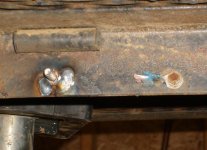CobyRupert
Super Member
It's not clear what people mean when they say use a ground wire instead of frame. Seems there are 2 possibilities:
1) Run a separate ground wire from each light instead of relying on the light contacting the frame as part of its mounting. Relying only on frame path requires paint be scraped where light mounts.
2) Other possibility is run a separate ground from the frame (trailer tongue) to the trailer's connector plug, and the vehicle's receptacle also has this terminal grounded to its frame, instead of relying on the connection through the ball (and the hitch /receiver)
I've only had to do the later.
Don't overlook that often there's a lot of paint and warning stickers on the removable draw bar (ball mount) that prevents a good conductive contact with the vehicles receiver when relying on the frame as a path. I've had to ground this off to get lights working.
Getting 20 volts is weird. Either something is going on with the trailer's battery somehow being in series the vehicle's (seems unlikely); or because of bad/missing connection (path), probably a ground, you're not really measuring across the battery.
(That is: If the battery negative terminal isn't connected to this reference (frame) that you measure from, the reading you get is meaningless; because you're only measuring voltage from the positive to the frame, but not the unknown voltage from frame to negative. This unknown voltage exists because the two are not connected.)
1) Run a separate ground wire from each light instead of relying on the light contacting the frame as part of its mounting. Relying only on frame path requires paint be scraped where light mounts.
2) Other possibility is run a separate ground from the frame (trailer tongue) to the trailer's connector plug, and the vehicle's receptacle also has this terminal grounded to its frame, instead of relying on the connection through the ball (and the hitch /receiver)
I've only had to do the later.
Don't overlook that often there's a lot of paint and warning stickers on the removable draw bar (ball mount) that prevents a good conductive contact with the vehicles receiver when relying on the frame as a path. I've had to ground this off to get lights working.
Getting 20 volts is weird. Either something is going on with the trailer's battery somehow being in series the vehicle's (seems unlikely); or because of bad/missing connection (path), probably a ground, you're not really measuring across the battery.
(That is: If the battery negative terminal isn't connected to this reference (frame) that you measure from, the reading you get is meaningless; because you're only measuring voltage from the positive to the frame, but not the unknown voltage from frame to negative. This unknown voltage exists because the two are not connected.)
Last edited:
